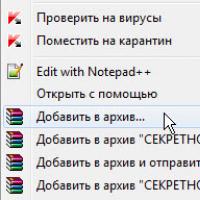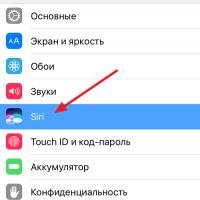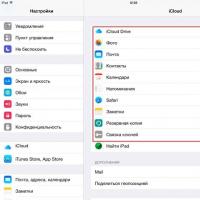Which companies have canceled roaming? The Big Four operators have announced the exact dates for the abolition of roaming. How does this happen
The exact dates have become known when the Big Four mobile operators will complete all measures to abolish intranet roaming in Russia.
The first to refuse roaming is the Beeline brand. As Gazeta.Ru previously reported, starting from August 20, all incoming calls for all subscribers will become free, regardless of the tariff.
“Thus, taking into account the wishes of our subscribers and listening to the opinions of , we have finally formed simple and understandable conditions for tariffing “like at home” for any services throughout Russia in the Beeline network,” said Executive Vice President of Marketing and Brand PJSC VimpelCom.
“MTS has carried out all the necessary preparatory work, and in the near future - from August 30 - incoming calls when traveling around the country will become free for subscribers of all the most popular tariff plans. The Internet will continue to operate throughout the country without additional payments,” a press secretary told Gazeta.Ru.
Thus, the Big Four will take turns finalizing the abolition of intranet roaming in the country by September 1, 2018.
A flat rate is just around the corner
She approved a bill to abolish roaming in Russia in July of this year. Parliamentarians called roaming “archaic,” which impedes the availability of communication services throughout the country. In addition, roaming charges are “only additional source income of the corresponding telecom operators."
An important provision of the document was the requirement to cancel the fee for receiving incoming calls if the subscriber calls from another region of Russia. When receiving a call from another country, the fee remains the same.
As follows from the explanatory note to the bill,
The abolition of roaming will contribute to the development of the communications market, more active involvement of communications subscribers in using the services of telecom operators, and will also increase the level of transparency in this area and make communication tariffs clear to subscribers.
In addition, according to the First Deputy Chairman of the Committee on Control and Regulations, discussions are underway on the introduction of a single tariff for communication services throughout the country.
Chairman of the Information Policy Committee, information technology and Communications in his speech pointed out that some provisions of the bill require some improvement.
“In particular, it is necessary to point out that the term “single tariff for services” does not exist in the legislation of the Russian Federation and is not specified by the bill. In addition, it seems appropriate to regulate not the payment for communication services, but the functions of the operator providing communication services to the subscriber, obliging him to establish the same conditions for the provision of such services for subscribers throughout the Russian Federation,” Levin said.
In the Committee's press release (available to Gazeta.Ru), Leonid Levin also talks about the upcoming abolition of national roaming in the country.
“During the autumn session, we expect to adopt a law long awaited by citizens, which provides for the abolition of national roaming and establishes the principle of a single tariff for voice call services in the networks of cellular operators.
After it is signed by the President and comes into force, citizens of our country will be able to safely travel around Russia without worrying about additional communication costs and maintaining their usual involvement in communication and a unified information environment,” the chairman said.
According to him, changes in legislation will not lead to an increase in prices for communication services.
“The capacity of the infrastructure of the main communication channels through which, among other things, operator voice calls are transmitted mobile communications, - is colossal and for the most part loaded with Internet traffic. In addition, fierce competition for subscribers forces cellular companies to maintain low prices for their services,” commented Leonid Levin.
Nobody likes to overpay for calls and cellular communications, but the current conditions and offers of various mobile operators are such that it is simply impossible to change the situation. And only recently have subscribers begun to hope for positive changes, so the question of when Tele2 roaming will be canceled in Russia is becoming more and more relevant.
The mobile operator itself is trying to clarify the current state of affairs. The company's press service has already announced decisions made, and now all that remains is to wait for their implementation. At the same time, the antimonopoly service gave telecom operators time to prepare and develop amended tariff plans that fully comply with the new requirements and wishes of legislators.
Demanding that the additional payment for calls within Russia be waived, the deputies pointed out the pointlessness of such an overpayment. They emphasized that the times when special conditions for such conversations made sense and were economically justified were irrevocably gone.
Lawmakers and initiators of change pointed out that almost every modern operator has its own extensive network of radio towers, which allows it to provide customers with high-quality communications without increasing its own costs. Therefore, if the costs of providing services became noticeably lower, tariff rates should have decreased accordingly.
But such changes did not happen at the initiative of mobile companies, so legislators are obliged to initiate them. And now, knowing the reasons for what is happening, it is necessary to find out whether roaming in Russia on Tele2 has been canceled.
Roaming canceled or not?
Speaking about whether the overpayment for calls has been canceled or not, it is necessary to emphasize that this process is more complicated than it may initially seem and takes time.
Right now it exists, and the connected services are provided on basic, standard terms. The operator promises to meet the deadline set by the antimonopoly service and introduce updated conditions no later than July of this year. Until then, existing provisions and prices may remain in effect.
It should be noted that mobile company will not put off innovations until the last moment and will definitely try to implement them as soon as possible, pleasing its own customers. Other mobile operators adhere to a similar policy.
Separate nuances and provisions

Speaking about the upcoming refusal of roaming, Tele2 emphasizes that the tariffs developed by the company have long been close to the new requirements and there will be no major changes in tariffs.
At the same time, you should find out about every innovation that will be introduced into the current conditions on the official portal mobile operator. To do this, you need to switch to the appropriate section. If you find him in a standard way If that doesn't work, you'll have to:
- open the official website;
- scroll down the start page and go to the “about Tele2” section;
- On the tab that opens, click on the item mentioning news.
In addition, you can check for changes by calling contact center or by contacting consultants in other ways.
When will internal roaming disappear?
Upcoming innovations should make mobile communications more profitable and convenient, so subscribers who are particularly actively anticipating changes should closely monitor what is happening and regularly check whether roaming within Russia Tele2 has been canceled on their connected tariff. This is necessary in order to start taking advantage of useful changes in a timely manner.
To receive the latest information, you should carefully follow the news that comes out and regularly communicate with the company’s specialists, who are required to advise clients on any questions they may have.
Relatively young operator cellular communications Yota is known not only for its tariffs with unlimited 4G Internet, but also for the pleasant cost of services when traveling around the country - it promises that the price tag for calls and Internet will not change. But there are a number of nuances that Yota subscribers need to take into account when roaming in Russia.
Does Yota have roaming in Russia?
Currently, Iota does not have roaming in Russia. The operator promises to keep the price tag home region while traveling around the country.
IMPORTANT! From May 23, 2019, Yota will completely cancel domestic roaming in a number of regions! From this date, you can stay in a “foreign” region as long as you need and pay for communications as at home!
Previously, a restriction was introduced for only 30 days of home communication. This was due to the fact that in different parts of Russia the cost of communication services differs; otherwise, unscrupulous subscribers from regions with expensive service would begin to use SIM cards from regions with lower costs.
Now Yota does not have a service for changing the connection region, only if you move to a permanent place of residence in some parts of the country, you will have to change your SIM card or use Yota’s services at the “regional special” tariff. But she still left it, but the conditions are quite democratic.
Yota: how to activate roaming in Russia

No additional ones are required, you can safely put your device (smartphone, tablet or modem) in your bag and go on the road: the connected tariff will continue to operate under the same conditions. Such simplicity is captivating, but this does not mean that you should ignore your connection.
How long could you use a Yota SIM card in Russia without roaming?
The first and main point of “no roaming” is that there is no time limit. Previously, the operator specified a period of at least 30 days.
The fact is that the “regional” tariff was activated only when the last paid one expired, but not earlier than 30 days from the moment the subscriber left his home region.
That is, if a Yota subscriber came to another region, and he paid for a tariff for 30 days and another 17 days remained unused, then after 17 days you can automatically extend your home tariff for another 30 days.
When the home package expired, the operator offered to connect packages within the “regional” tariff. The price tag of this tariff plan is the same for everyone (except for corporate clients) and was valid throughout the country, except for the Crimean Peninsula.

Features of the Iota Internet roaming in Russia
Traffic is provided only as part of your package.
There are also restrictions for a number of regions - within the paid period, 50 MB are available without a transfer speed limit, then the speed drops to 64 Kbps. This concerns some settlements Trans-Baikal Territory, Irkutsk and Magadan Regions, Kamchatka Territory, Republics of Buryatia and Yakutia, Khabarovsk Territory, Sakhalin Region and Chukotka Autonomous Okrug. Full list available on the official website.
Roaming in Crimea
Today, the Iota operator still has roaming in Crimea, including the city of Sevastopol. The tariff is activated automatically as soon as you arrive in the K-Telecom coverage area. Let's move straight to the terms of communication.
- Incoming calls - 2.5 rubles/min.
- Calls to Russian regions (except Crimea) - 2.5 rubles/min.
- On the territory of the Republic of Crimea, a call is also 2.5 rubles per minute.
- Calls to other countries - 129 rubles/min.
- Outgoing SMS message - 2.5 rubles per piece.
- MMS - 20 rubles/pcs + traffic cost.
- Mobile Internet - 2.5 rubles/MB.
As you can see, prices are very reasonable, so feel free to pack your suitcase and think only about relaxation! Eta has already taken care of saving money with its roaming in Crimea.

Roaming Yota in Chukotka Autonomous Okrug
As we mentioned above, Yota roaming does not exist in Russia, with the exception of the Republic of Crimea and the Chukotka Autonomous Okrug.
When a client moves to the territory of a given district, services will be provided under the terms of the “Regional Special” tariff.
Any outgoing calls in Russia, with the exception of Crimea and Sevastopol - 9.9 rubles/min. SMS with the same condition - 9.9 rubles per piece.
In terms of the Internet, if you have a connected package, you will have access to 50 MB without a speed limit, after which the speed drops to 64 Kbps.
Tariff "Regional"
Before the cancellation of Yota roaming in Russia, when changing the region, it was possible to subscribe to the “Regional” tariff. On this moment There is no such charging method.
For tablet and smartphone

For the tablet, the operator offered a choice of three packages unlimited internet:
- Day 100r;
- Month 800r;
- Year 6000 rub.
For a smartphone everything was cheaper, but still more expensive than in the home region;
- 200 minutes – 300 rub.
- 500 – 350 rub.
- 800 - 600 rub.
- 2000 – 1000r
- 5000 – 2500rub
Traffic volume:
- 2 GB – 50r
- 5 GB – 100r
- 10 GB – 180r
- 15 GB – 250 rub.
- 30 GB – 350 rub.
Today, this plan simply does not exist. Its analogue is the Yota “Regional Special” tariff and is valid only in the Chukotka Autonomous Okrug.

Regional for modem
Since there is no tariff, all conditions for the use and price of the modem remain the same as in the home region.
The only point worth remembering! In the Chukotka Autonomous Okrug, you will not be able to use Internet services via a modem.
How to be safe
There is no need to leave the situation to chance; it’s a good idea to find out all the details and current prices in advance. The best option will go to the support service chat and clarify in detail: where and from what city the trip is planned, how many minutes, megabytes and days are left until the end of the package, from what date the “regional” tariff will begin to apply. 20 minutes of time can save a lot of time and money when traveling around Russia.
Mobile operators of the Big Three announced the abolition of fees for incoming calls while roaming in Russia. These events are being carried out within the framework of last year’s order of the Federal Antimonopoly Service of Russia, which required operators to reduce and equalize communication tariffs when traveling around the country.
The Beeline brand was the first to announce the abolition of fees for incoming calls from other regions. This information was confirmed to Gazeta.Ru by the company's press secretary.
Previously, Beeline subscribers on “junior” tariffs paid for long-distance incoming calls at 5 rubles per minute. Starting from August 20, all incoming calls for all subscribers will be free, regardless of the tariff plan and payment system.
“Since April, all our subscribers, when traveling outside their region in Russia, call, send SMS and use the mobile Internet just like at home. This allowed many clients to reduce communication costs several times. The next important step: we are canceling fees for any incoming calls when traveling around Russia on the Beeline network. Thus, taking into account the wishes of our subscribers and listening to the opinion of the Federal Antimonopoly Service, we have finally formed simple and understandable conditions for tariffing “like at home” for any services throughout Russia in the Beeline network,” the Executive Vice President for Marketing and Brand commented on the innovation PJSC VimpelCom.
The cancellation of incoming fees was also reported.
“MTS has carried out all the necessary preparatory work and in the near future incoming calls while traveling around the country will become free for our subscribers. When moving around Russia, MTS subscribers will be able to use tariffs as in their home region,” the MTS press service reported. The press service representative did not specify when exactly the changes would come into force.
“The cost of incoming calls from all regions when traveling around Russia will be reset to zero for most subscribers until the end of August, for the rest - in the first half of September,” the press service told Gazeta.Ru.
The press secretary explained to a Gazeta.Ru correspondent that the company’s clients “have been using communications on trains across Russia for a long time, as in their home region,” and roaming has already been canceled on most Tele2 tariffs. She added that the deadline for canceling intranet roaming was extended by the Federal Antimonopoly Service until August 31.
“Before this date, we will complete all measures to cancel intranet roaming,” Galushina concluded.
Not canceled yet
In June 2017, the head of the FAS for the first time announced the preparation of documents to remove the concept of roaming within the country from legislation.
Mobile operators received the first warning from the Federal Antimonopoly Service in July 2017. Then, during its investigation, the FAS discovered unfairly inflated prices for roaming communications and demanded that the difference in tariffs be eliminated within two weeks.
The Antimonopoly Service decided that the price offers of mobile operators and the terms of service provision were “neither economically nor technologically justified” and issued an order to equalize tariffs in the home region and other regions of the country.
At the end of 2017, the former Minister of Communications and Mass Communications expressed confidence that intranet roaming will be completely abolished in 2018, noting that mobile operators are already taking the necessary measures.
On July 10, 2018, in the first reading, it adopted a bill on the abolition of national and intranet roaming in the country. As one of the authors of the document noted, the difference in tariffs, which vary depending on the region, is archaic. In addition, the presence of roaming makes communications less accessible to citizens, and the only ones who benefit from it are the mobile operators themselves.
Parliamentarians stated that the abolition of intranet roaming would contribute to the development of the communications market.
Date: 21 Feb 2018
Attention!. Read the latest information at the link.
The FAS keeps asking and asking mobile operators to remove roaming, but they keep resisting and resisting. Has MTS finally canceled roaming in Russia or not? Let's figure it out.
FAS and Roaming
First you need to understand what roaming is. Intranet roaming is a communication and data service provided by a mobile operator outside the “home region” in the network of this operator. Your home region is considered to be the region of Russia in which you purchased and issued your SIM card. Tariffs for mobile communications and data services outside your home region may differ from tariffs in your home region and, most often, this is the case.
The FAS has been trying for many months to “convince” telecom operators that intranet roaming is a relic of the past and needs to be abolished. But mobile operators are reluctant, because if roaming is completely cancelled, they could lose a lot of money. By the way, MTS has changed the conditions of national roaming (Crimea, etc.). You can read about this.
What did MTS do? At least there are no statements about the cancellation of roaming this time, and this indicates two things: MTS did not lie in the title, roaming has not been cancelled. But let's figure out what changes await us.
Video on the topic
On our YouTube channel you can watch a video version of this news
Changes from February 28 and March 14, 2018
From February 28, 2018, a number of tariff plans (including archived ones) will have a new tariff for minutes, SMS and mobile internet outside the home region in the MTS network (the same intranet roaming). MTS promises price reductions from two to ten times.
Based on the news, it can be noted that the changes will affect only the tariff plans "", "", "", "", and "". Extremely modest, to be honest. Anyway…
Changes in roaming conditions for “Smart”, “Smart Unlimited”, “My Unlimited”
From February 28, 2018, on Smart, Smart 052013, Smart 102014, Smart Unlimited 032017 and My Unlimited tariffs, the paid option of intranet roaming is cancelled. The one that was 15 rubles a day. Now you can use packages of minutes, SMS and Internet in your home region for free.
On the one hand, the news is certainly good. On the other hand, for such a description of a service with a footnote, MTS should have been fined long ago and forced to change the description. The tariff is valid throughout Russia, but please pay for it. It's good that this was removed altogether...
The package of minutes will be spent on MTS Russia numbers, as well as on numbers in the region of your stay. If the package of minutes runs out, calls to MTS Russia numbers will remain free.
Any incoming calls from the region of your stay are 0 rubles per minute, but other incoming calls are 5.5 rubles per minute. But this is not great at all. Especially considering that All new MTS tariffs included free incoming calls even in roaming! And what is this “like in your home region”? After all, at home you don’t pay for incoming messages from other regions of Russia? It is in such details that the essence of the abolition of roaming should lie! But no, alas. If you receive a call from your home region to the region where you are staying, then please pay 5.5 rubles per minute incoming call. Not cool, MTS!
If the package includes long-distance outgoing calls to numbers of other operators, then they will be spent outside the home region. In this case, if you go on a trip to Russia, your home region ceases to be your home region - now calls to this region are considered long-distance. If long-distance calls to numbers of other operators are not included in the package of minutes, then a minute will cost 5.5 rubles.
SMS to numbers in the region of your stay will be consumed from the package of minutes.
The services “All Russia SMART” and “Everywhere at home SMART” will no longer be paid for data tariff plans, and payment for communications will occur according to new conditions. Is this healthy? Yes, so-so, to be honest. The fact is that with a service, for example, “Everywhere at home,” you could really be at home everywhere, but now it turns out that you will be at home only in the region where you are staying. And even then, it’s not quite “like home” (hello, paid incoming calls). Nothing is said about the “Everywhere at home” service (without SMART), so we will assume that it will still be available on these tariff plans.
Changes in roaming conditions for “Super MTS” or “My Friend”
“My friend” is the same as “Super MTS”, only you are given a SIM card as a gift. You can read about the “My Friend” tariff.
From March 14, 2018, there will be changes to the conditions of intranet roaming on the tariffs of the “Super MTS” and “My Friend” lines.
Incoming calls from numbers in your region of residence are free (instead of 10.9 rubles per minute). Good news! Incoming calls from numbers in your home region and other regions of Russia - 5.5 rubles per minute ("instead of 10.9 rubles per minute" - it is written in the official MTS news, but this only applies to very old tariffs, because new incoming calls were free!)
Outgoing calls to any numbers in the region of residence - according to the conditions of the home region (instead of 14 rubles per minute), outgoing to numbers of operators in the home region and MTS of Russia - 5.5 rubles per minute (instead of 10.9 rubles per minute), outgoing to numbers of operators other operators in other regions of Russia - 5.5 rubles per minute (instead of 14 rubles per minute).
SMS to numbers in the region of your stay - 1.95 rubles (place 3.95 rubles), SMS to other numbers in Russia - 2.95 rubles (instead of 3.95 rubles).
Also, for a whole bunch of options, money will no longer be withdrawn, and the conditions will be new. That is, these options will not work in these tariffs.

The “Bit” and “MiniBit” options will work when traveling around Russia at home without any additional payments or additional connections.
And again for old times...
MTS seems to have lowered prices, removed fees for some dubious services (15 rubles per day on Smart phones), but at the same time, for many subscribers, the need to connect to roaming services will not go away, which allows you to feel “at home” when traveling around Russia, since incoming from your home region will become paid.
And if you need such calls to be free, and calls to the numbers of all mobile operators in Russia cost you 3 rubles per minute, then you need to activate the new additional option “Russia is at home everywhere.” Option Description: .
A service will also be offered for the “Smart”, “Smart Unlimited”, “My Unlimited” - “Home Package Russia” tariffs. This option will allow you to receive all incoming calls for free, and calls and SMS to your home region will be spent from the packages. Option Description: .
And what happens in the end? If you want to be “like at home”, do you need to connect additional paid options? What is this cancellation of roaming? Yes, prices have dropped, but this is only a tiny step towards cancellation. Let's see what the FAS says...
 Order 343 mail. Order by Russian post. Consequences of failure to appear in court when summoned
Order 343 mail. Order by Russian post. Consequences of failure to appear in court when summoned How to put a password on a folder on a Windows computer without and with programs
How to put a password on a folder on a Windows computer without and with programs Pluton – Free Bootstrap HTML5 One Page Template
Pluton – Free Bootstrap HTML5 One Page Template History of ZX Spectrum: Myths and reality New Spectrum
History of ZX Spectrum: Myths and reality New Spectrum Voice assistant Siri from Apple Siri functions on iPhone 6s
Voice assistant Siri from Apple Siri functions on iPhone 6s How to roll back to a previous version of iOS?
How to roll back to a previous version of iOS? Unlock iPad in four days
Unlock iPad in four days